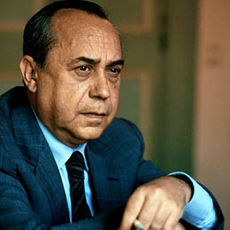Home - In and around
LEONARDO SCIASCIA
Biography
Leonardo Sciascia, (Racalmuto, Agrigento 1921 - Palermo 1989), Sicilian writer known for his novels focused on the link between power and corruption in Sicily, was born at the center of the island, the land of sulfur mines and savory writers like Vitaliano Brancati, Gesualdo Bufalino and Elio Vittorini.
Elementary school teacher in Caltanissetta from 1949 to 1957, the city where you fit attending culturally vibrant environments and anti-fascists, also lives in Palermo from 1957 to 1968, publishing novels, short stories, plays and essays that make up a work thematically unified.
The parishes of Regalpetra (1956) is the first collection of short stories that examine the conditions of the rural Sicily, subject to the constraints of the Mafia, the Fascist Party and, after the war, diverted to the management of power by the new local government Democrats. Follow the stories of uncles of Sicily (1958) and the novels on contemporary Sicily in which a journalist of Sciascia gives the narrative the corrosive tone investigation. Among them The Day of the Owl (1961) is his most famous book, the best-selling, the first to be translated abroad; a novel in which for the first time the mafia is represented as a moment of transition from the domain of the domain of the city campaigns. In the same year Sciascia collects some essays of literary criticism in the book Pirandello and Sicily.
With To Each His Own (1966) and Todo modo (1974, adapted cinematically in 1976 by Elio Petri director), focused on the story of criminal investigations by the police, the crime is defined more style Sciascia. The originality of the language and the philosophical and metaphorical dimension in which it is projected the suspense they do it soon emerge for originality so that most of his novels have been represented by the cinema.
The context of the novel (1971), is in fact derived the film by Francesco Rosi Corpses (1976). Even The Council of Egypt (1963), Candide (1979) and other novels enact, from different points of view and presenting various social, aspects of Sicilian history that tends to become the model of the human condition. Just this image is the one that the cinema has adopted as the most realistic portrait of Sicily of the corruption of the hottest years of the link between political corruption and mafia.
Since 1978 Sciascia focuses essays and political activity (L'affaire Moro, 1978. On the side of infidels, 1979) and, as a representative of the Radical Party, he became a member of the European Parliament and of the Italian Parliament in 1979. The past years have short novels the witch and the captain (1986), open Doors (1988, from which in 1990 Gianni Amelio has the eponymous film starring Gian Maria Volonte) and a simple story (1989), the last book before his death, works in which behind the usual compelling narrative trace appear ever more insistently content of painful and deep moral and philosophical reflection.
Leonardo Sciascia, (Racalmuto, Agrigento 1921 - Palermo 1989), Sicilian writer known for his novels focused on the link between power and corruption in Sicily, was born at the center of the island, the land of sulfur mines and savory writers like Vitaliano Brancati, Gesualdo Bufalino and Elio Vittorini.
Elementary school teacher in Caltanissetta from 1949 to 1957, the city where you fit attending culturally vibrant environments and anti-fascists, also lives in Palermo from 1957 to 1968, publishing novels, short stories, plays and essays that make up a work thematically unified.
The parishes of Regalpetra (1956) is the first collection of short stories that examine the conditions of the rural Sicily, subject to the constraints of the Mafia, the Fascist Party and, after the war, diverted to the management of power by the new local government Democrats. Follow the stories of uncles of Sicily (1958) and the novels on contemporary Sicily in which a journalist of Sciascia gives the narrative the corrosive tone investigation. Among them The Day of the Owl (1961) is his most famous book, the best-selling, the first to be translated abroad; a novel in which for the first time the mafia is represented as a moment of transition from the domain of the domain of the city campaigns. In the same year Sciascia collects some essays of literary criticism in the book Pirandello and Sicily.
With To Each His Own (1966) and Todo modo (1974, adapted cinematically in 1976 by Elio Petri director), focused on the story of criminal investigations by the police, the crime is defined more style Sciascia. The originality of the language and the philosophical and metaphorical dimension in which it is projected the suspense they do it soon emerge for originality so that most of his novels have been represented by the cinema.
The context of the novel (1971), is in fact derived the film by Francesco Rosi Corpses (1976). Even The Council of Egypt (1963), Candide (1979) and other novels enact, from different points of view and presenting various social, aspects of Sicilian history that tends to become the model of the human condition. Just this image is the one that the cinema has adopted as the most realistic portrait of Sicily of the corruption of the hottest years of the link between political corruption and mafia.
Since 1978 Sciascia focuses essays and political activity (L'affaire Moro, 1978. On the side of infidels, 1979) and, as a representative of the Radical Party, he became a member of the European Parliament and of the Italian Parliament in 1979. The past years have short novels the witch and the captain (1986), open Doors (1988, from which in 1990 Gianni Amelio has the eponymous film starring Gian Maria Volonte) and a simple story (1989), the last book before his death, works in which behind the usual compelling narrative trace appear ever more insistently content of painful and deep moral and philosophical reflection.



